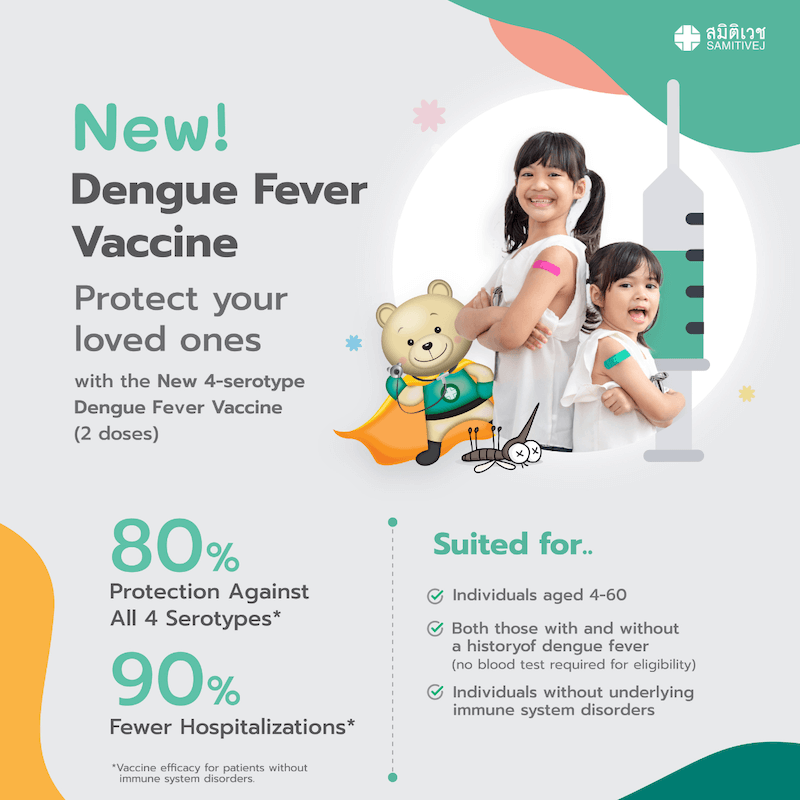The summer holidays have finally arrived – many people are now getting ready to enjoy a holiday either in Thailand or further afield. With a bit of forward planning, many health issues that could arise during your vacation can actually be avoided, while at the same time preventing your trip from being ruined by unnecessary medical bills.
Here are the top 5 most common avoidable issues and how best to prepare for them.
1. Mosquito and other Insect Bites
Mosquito bites can not only be an annoyance but also a source of disease, especially in Southeast Asia where mosquitoes can carry the dangerous malaria and dengue viruses. Avoiding bites is probably the most effective prevention measure. DEET works miracles to keep the mozzies and other pesky critters at bay and, for some people, herbal repellents also work. Repellents can be bought at all pharmacies. If travelling to a destination that is known to have malaria risk, it is advisable to take anti-malarial tablets, such as Doxycycline, Mefloquine (most people are concerned about side effects) or Malarone.
You have very little risk of malaria if you travel only in Bangkok, Pattaya, Samui island, Phuket and other urban areas. Dengue is prevalent everywhere, however. You may have some risk if you travel in forested areas or in border areas and the use of protective clothing, bed nets and insect repellents is recommended.
2. Vaccinations
Seasoned travellers are well aware they have to keep their vaccinations up to date. It’s highly advisable to have a vaccination against influenza since it’s the number one vaccine-preventable illness. Tetanus vaccine is recommended every 10 years in adults. It’s best to start your vaccination programme early as it can take a series of vaccinations over a few weeks to become immunized against various illnesses and diseases. Make sure you check with your doctor which ones are recommended for the destination you’re planning to visit.
3. Coughs and Colds
The last thing you need during your trip is to catch a cold and then feel too rundown to visit all the wonderful sights of the destination you’ve travelled halfway across the world to see. The good news is that colds and coughs can usually be treated with over-the-counter medicines available at local pharmacies. If the cough, cold or sore throat seems to be getting worse over time and secondary bacterial infection has set in, then taking an antibiotic, such an Amoxil, should nip it in the bud. For those allergic to penicillin-based medications, Clarithyromycin is a good alternative.
4. Diarrhoea and Vomiting
Even if exercising caution while trying out a delectable-looking new cuisine, you can have the misfortune of getting an upset stomach (gastroenteritis) or diarrhoea. Savvy travellers pack medicines like Motilium, which helps keep food down, and Loperamide, which can be taken for diarrhoea. It’s vital to keep hydrated, which is why carrying rehydration sachets, ORS (Oral Rehydration Salts), is a good idea to avoid dehydration and loss of electrolytes. If the diarrhoea persists, adults can take Ciprofloxacin and probiotics such as Bioflor.
5. Basic First Aid
If you’re planning an active or adventurous holiday involving hiking or camping, bringing along some basic first aid supplies should be top of your travel list. Common injuries like minor cuts and sprains are easy to deal with. For cuts, washing out with clean water followed by a good antiseptic, such as Betadine, works wonders. If the wound becomes inflamed, an application of an antibiotic cream such as Fucidin or Bactroban should be sufficient to treat any infection. Make sure you use a dressing afterwards to cover the wound. Good ready-made dressings to watch out for at the drugstore are Opsite or Nexcare. Sprains can be wrapped using an elastic bandage, followed by a regimen of “RICE” – i.e. Rest, Ice, Compress, Elevate – to ease the pain and the swelling.
Last but not least, be sure to consult with your doctor before leaving if you are unsure about the suitability of any medication suggested above or need further advice. If you have any underlying medical conditions, are pregnant, or have known allergies to certain drugs then it is essential to contact your doctor before taking a course of medication.
For more info, please contact Dr. Donna Robinson, General Practitioner, MedConsult Clinic:
Tel: 02-018-7855
Clinic Mobile: 092-269-4368
Address: The Racquet Club, 8 Sukhumvit Soi 49/9, Floor 3, Building 2
Email: info@medconsultasia.com
Website: www.medconsultasia.com
Facebook: MedConsultClinicAsia
Clinic Hours: Monday-Friday 08.00-18.00, Saturday: 08.00-14.00
Register your email address here and we’ll notify you when new articles get uploaded.














